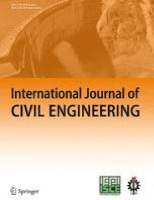
International Journal of Civil Engineering
Scope & Guideline
Transforming Challenges into Engineering Excellence
Introduction
Aims and Scopes
- Structural Engineering:
Research on the design, analysis, and performance of structures, including buildings, bridges, and tunnels, with a focus on materials, loads, and environmental effects. - Geotechnical Engineering:
Studies related to soil behavior, foundation design, and the interaction between soil and structures, addressing issues like liquefaction, slope stability, and earth pressure. - Transportation Engineering:
Exploration of transportation systems, including traffic management, road design, and the impact of infrastructure on mobility and safety. - Water Resources Engineering:
Research on hydraulic systems, water quality, and flood management, focusing on sustainable practices and the impact of climate change. - Construction Management and Technology:
Investigations into construction methods, project management, and the integration of new technologies and materials to improve efficiency and sustainability. - Environmental Engineering:
Studies aimed at addressing environmental challenges through innovative engineering solutions, including waste management, pollution control, and sustainable construction practices. - Material Science in Civil Engineering:
Research on innovative materials and their applications in civil engineering, including the use of recycled materials, composites, and performance under various conditions.
Trending and Emerging
- Sustainable and Resilient Infrastructure:
A growing emphasis on developing infrastructure that is sustainable and resilient against climate change and natural disasters, promoting the use of eco-friendly materials and design practices. - Advanced Computational Techniques:
An increase in the application of computational modeling, simulation, and artificial intelligence in civil engineering, enhancing predictive capabilities and optimizing designs. - Smart Materials and Structures:
Research into smart materials that respond to environmental changes, such as self-healing concrete and shape-memory alloys, is gaining traction for their potential to enhance structural performance. - Data-Driven Decision Making:
The integration of big data and machine learning techniques in civil engineering to improve project management, predictive maintenance, and performance evaluation of infrastructure. - Climate Adaptation Strategies:
Emerging research focused on adapting civil engineering practices to mitigate the impacts of climate change, including flood resilience and heat island effect mitigation. - Health Monitoring and Diagnostics:
A trend towards developing advanced health monitoring systems for existing structures using IoT and sensor technologies to ensure safety and longevity.
Declining or Waning
- Traditional Materials Research:
Research focusing solely on conventional materials like plain concrete and steel has seen a decline, as the field shifts towards more innovative materials and sustainable alternatives. - Static Analysis Methods:
The reliance on traditional static analysis methods for structural assessment is diminishing, with a growing emphasis on dynamic analysis and real-time monitoring techniques. - Local Case Studies:
While case studies remain important, there is a noticeable reduction in papers focused solely on localized issues without broader applicability or theoretical contributions. - Conventional Construction Techniques:
Research on traditional construction techniques is being overshadowed by studies exploring modern, technology-driven methodologies and automation in construction. - Single-Disciplinary Approaches:
There is a waning interest in research that does not integrate multiple disciplines, as interdisciplinary approaches are increasingly valued for addressing complex civil engineering challenges.
Similar Journals

Innovative Infrastructure Solutions
Pioneering Research for Cutting-Edge Infrastructure Development.Innovative Infrastructure Solutions is a leading academic journal published by Springer International Publishing AG, focusing on pioneering advancements in the fields of building and construction, civil and structural engineering, and environmental engineering. With an impact factor that reflects its significant role in the academic community, this journal serves as a vital platform for researchers, professionals, and students to disseminate groundbreaking studies and novel methodologies spanning diverse engineering disciplines. Since its inception in 2016, Innovative Infrastructure Solutions has steadily positioned itself within the Q2 category across several fields, including geotechnical engineering and engineering geology, as recognized in the 2023 quartiles. This reputable journal, accessible from Switzerland, not only emphasizes collaboration and knowledge exchange but also empowers innovators in infrastructure development globally. Whether you're contributing to a research project or seeking the latest findings, Innovative Infrastructure Solutions remains essential for anyone invested in advancing sustainable infrastructure solutions.

Civil Engineering Journal-Tehran
Transforming Challenges into Solutions in Civil Engineering.Civil Engineering Journal-Tehran is a premier academic publication focusing on the dynamic fields of civil engineering, construction, and environmental science. Published by C EJ PUBLISHING GROUP, this journal has garnered significant recognition, reflected in its impressive quartile rankings—ranking Q1 in Building and Construction and Civil and Structural Engineering, and Q2 in Environmental and Geotechnical Engineering. With its ISSN 2676-6957 and E-ISSN 2476-3055, this journal serves as a crucial platform for disseminating innovative research and advancements from 2019 through 2024. Notably situated at K N Toosi University of Technology in Tehran, Iran, it emphasizes both local and global perspectives on civil engineering challenges. Aiming to foster scholarly discourse, the journal is essential for researchers, students, and professionals dedicated to the evolution and sustainability of civil engineering practices.
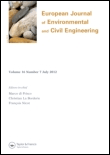
European Journal of Environmental and Civil Engineering
Exploring Interdisciplinary Approaches to Environmental ChallengesThe European Journal of Environmental and Civil Engineering, published by Taylor & Francis Ltd, is a prestigious peer-reviewed journal that serves as a vital platform for advancing knowledge in the fields of Civil and Structural Engineering as well as Environmental Engineering. With an impressive impact factor and categorized in the Q2 quartile for both engineering fields, this journal occupies a significant position in the scholarly community. Its focused scope encompasses innovative research, case studies, and practical applications that address contemporary environmental and infrastructural challenges. Researchers, professionals, and students alike benefit from the journal's commitment to high-quality discourse, as evidenced by its Scopus rankings, which place it in the top 30% in Civil and Structural Engineering and the top 40% in Environmental Engineering. Through the publication of cutting-edge studies and a commitment to fostering interdisciplinary dialogue, the European Journal of Environmental and Civil Engineering remains an essential resource for those dedicated to improving our built environment and safeguarding our natural resources.

Ingenieria UC
Unlocking Potential Through Accessible Engineering InsightsIngenieria UC is a distinguished academic journal published by Universidad Carabobo, focusing on the dynamic and evolving field of engineering. As an Open Access journal since 1992, it ensures that groundbreaking research and innovative findings are accessible to a global audience, fostering collaboration and knowledge sharing in the engineering community. With its ISSN 1316-6832 and E-ISSN 2610-8240, Ingenieria UC is committed to disseminating high-quality research that spans various engineering disciplines, including civil, mechanical, electrical, and systems engineering. The journal not only serves as a platform for scholarly exchange among researchers, professionals, and students but also plays a significant role in advancing engineering practices and education in Venezuela and beyond. Researchers aiming to disseminate their work in a reputable forum will find Ingenieria UC to be an invaluable resource that aligns with contemporary academic and industrial developments.
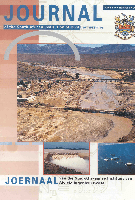
Journal of the South African Institution of Civil Engineering
Empowering engineers with cutting-edge research.Journal of the South African Institution of Civil Engineering (ISSN: 1021-2019) is a distinguished open-access publication dedicated to advancing the field of civil engineering in South Africa and beyond. Established by the South African Institution of Civil Engineering (SAICE) and South African Institute of Steel Construction (SAISI), it serves as a critical platform for sharing research, case studies, and industry developments. The journal has been openly accessible since 2015, ensuring broader dissemination of knowledge among researchers, professionals, and students alike. Although it currently holds a Q4 ranking in Civil and Structural Engineering and is positioned within the lower percentiles in Scopus rankings, its commitment to fostering growth in the engineering sector remains strong. Covering various topics from structural design to innovative construction methodologies, the journal invites contributions that push the boundaries of current practices and methodologies. This publication is essential for those invested in sustainable engineering solutions, aiming to collaborate and contribute towards the evolution of civil engineering standards in South Africa.

Turkish Journal of Civil Engineering
Advancing the Future of Civil EngineeringWelcome to the Turkish Journal of Civil Engineering, a pioneering publication under the auspices of the TURKISH CHAMBER OF CIVIL ENGINEERS, dedicated to advancing the field of civil engineering and construction. With a focus on cutting-edge research and innovative practices, this journal seeks to provide a platform for scholars, professionals, and students to share their findings and insights within the sphere of civil and structural engineering. The journal is committed to open access, ensuring that research is readily available to a global audience. As it embarks on its journey from 2023 to 2024, it aims to enhance its reputation as a vital resource within the academic community, currently ranking in the 40th percentile for Building and Construction Engineering and 32nd for Civil and Structural Engineering in Scopus. We encourage contributions that push the boundaries of engineering knowledge, fostering collaboration and progress in this essential field.
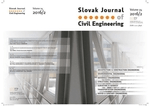
Slovak Journal of Civil Engineering
Fostering collaboration for a sustainable engineering future.Welcome to the Slovak Journal of Civil Engineering, a premier open-access publication dedicated to advancing the field of civil engineering. Published by SCIENDO, this journal has been providing a platform for the dissemination of groundbreaking research since 2010, ensuring that all articles are freely accessible to a global audience. With a commitment to promoting innovation and excellence within civil engineering, the journal covers a wide range of topics, including structural engineering, transportation systems, geotechnics, and environmental engineering. The Slovak Journal of Civil Engineering is designed to engage a diverse community of researchers, professionals, and students, fostering collaboration and knowledge-sharing to address contemporary challenges in the field. With its open-access model, the journal not only enhances visibility for authors but also ensures that the latest findings and methodologies reach practitioners and academics alike, making it an essential resource for anyone interested in civil engineering advancements. Stay connected with the evolving landscape of civil engineering through this influential publication.
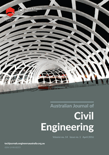
Australian Journal of Civil Engineering
Innovating Infrastructure for TomorrowThe Australian Journal of Civil Engineering, published by Taylor & Francis Ltd, stands as a pivotal platform within the field of civil and structural engineering. With an ISSN of 1448-8353 and an E-ISSN of 2204-2245, this journal consistently delivers high-quality research and innovative practices from both established and emerging scholars in the discipline. Recognized in the Q2 category for Civil and Structural Engineering in 2023, it holds a respectable position, ranking 146 out of 379 within its field according to Scopus, which places it in the 61st percentile. Converging valuable insights from 2011 through 2024, the journal encompasses a broad scope of topics, including sustainable infrastructure, innovative materials, and advanced construction techniques, thereby addressing contemporary challenges faced by engineering professionals. Though it is a traditional publication without open access options, the quality of the research featured ensures that it remains an essential resource for academics, practitioners, and students striving to enhance their knowledge and contribute to the dynamic field of civil engineering.

Civil Engineering Journal-Stavebni Obzor
Pioneering Research from the Heart of PragueWelcome to the Civil Engineering Journal-Stavebni Obzor, an esteemed academic publication dedicated to advancing the field of civil engineering. Published by the Czech Technical University in Prague, Faculty of Civil Engineering, this journal has provided a platform for innovative research and critical discourse since its inception. With an ISSN of 1210-4027 and an E-ISSN of 1805-2576, this Open Access journal has been facilitating wide dissemination of knowledge in civil engineering since 2014, ensuring that valuable research reaches a global audience without barriers. The journal is committed to fostering collaboration among researchers, professionals, and students, encouraging the exchange of ideas that drive the discipline forward. Its diverse scope encompasses various aspects of civil engineering, making it an essential resource for anyone looking to stay at the forefront of this dynamic field. Located in Prague, a hub of engineering excellence, this journal not only reflects the latest trends and innovations but also contributes to shaping the future of civil engineering.

CIVIL ENGINEERING
Bridging Knowledge and Practice in Civil EngineeringCIVIL ENGINEERING is a prominent journal published by the American Society of Civil Engineers (ASCE), dedicated to advancing the field of civil engineering since its inception in 1969. With an ISSN of 0885-7024, this journal spans a wide range of topics, including civil and structural engineering, geotechnical engineering, and materials science, reflecting its comprehensive coverage of the discipline. Although currently categorized in the Q4 quartile for several fields, the journal provides a platform for researchers, professionals, and students to present innovative solutions and research findings that push the boundaries of civil engineering practices. While it does not offer open-access options, its accessibility through institutional subscriptions ensures that critical research remains within reach for those intent on furthering their understanding and applications in the field. Conference proceeding articles, case studies, and theoretical papers contribute to its mission of fostering communication and knowledge exchange among civil engineering practitioners and scholars. The journal's commitment to quality and relevance in today's evolving engineering landscape makes it an essential resource for informed decision-making and professional development.